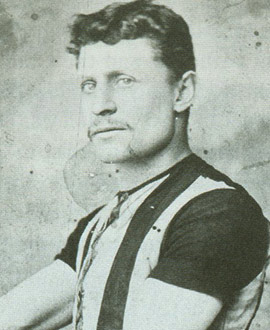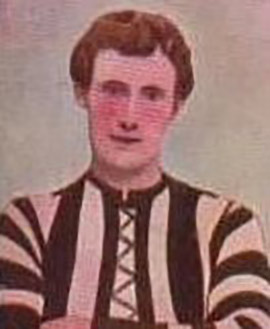By Glenn McFarlane:
The Army was required to notify next-of-kin when soldiers were either killed or wounded well before those names were released to the newspapers.
Yet given the mass number of casualties during the First World War, and the chaos of communication breakdowns, there were going to be cracks in the system – and some with heartbreaking consequences.
One such breakdown happened in regard to Don Fraser, former Collingwood footballer and a member of the club’s 1905 losing Grand Final team to Fitzroy.
Fortunately, the end result was better than it had been in other instances, but just imagine how Fraser’s brother, Hamilton, who was also his next-of-kin felt when he opened up the Argus and in the casualty lists, he happened to glance at his brother’s name.
Fraser, serving with the 22nd Battalion, had been badly gassed in France on July 21, 1918. But his name appeared in the casualty lists before his brother had received official word.
It prompted Hamilton Fraser to write to the Department of Defence to point out the embarrassing slip-up: “I understood that any word coming from a casualty from the front was sent to the next of kin before the list came out in the paper.” There was understandable anger, though Fraser’s situation was not as dire as it could have been, although it was serious enough to see him sent over to England to recuperate.
Fraser had enlisted in 1916 – a decade after he played his last game with Collingwood.
He had been a very serviceable half-back in the Collingwood team across three seasons, playing a total of 31 games, with the most high profile match being that Grand Final of 1905.
Born in Terang, and recruited from Leopold after a short stint with Collingwood Juniors, he first played for the Magpies in Round 5, 1904, in a close-fought game against Carlton at Victoria Park.
He played eight matches that season, but locked in his spot the following year when representing the club in 19 matches, including the semi-final against South Melbourne (lost) and the Grand Final against Carlton (lost).
But only four more games would follow in 1906 – two at the start of the season and two near the end. His last game, against Melbourne in Round 17, came on the day before his 24th birthday.
He was a bank agent living at Dalyston when he enlisted at the age of 34. He embarked on the Argyllshire on October 31, 1916 and would serve his country on the Western Front for more than 18 months.
Fraser returned home to Australia in mid-1919, and made a request for free passage for his fiancé. He ended up on a farm at Lauriston. During the 1939 bushfires, his house burnt to the ground and his medals and discharge paper were destroyed. He applied to have replacements made.
Like so many others who had been gassed, Fraser would be troubled at times for years after, but he lived until two months short of his 81st birthday, dying on July 18, 1963.




